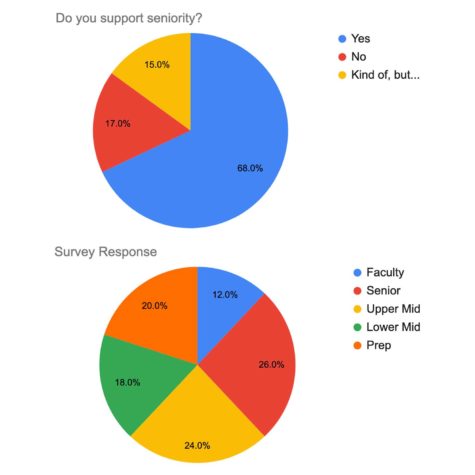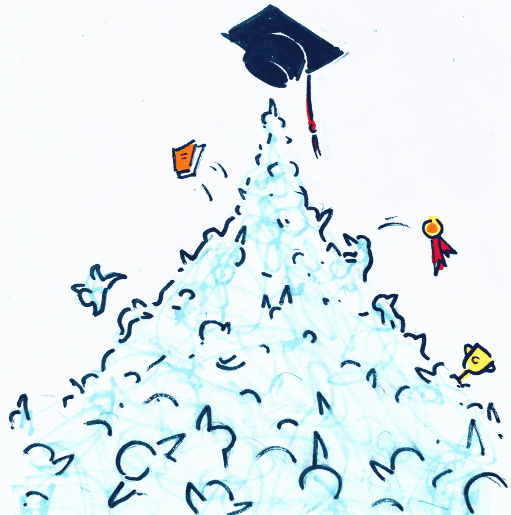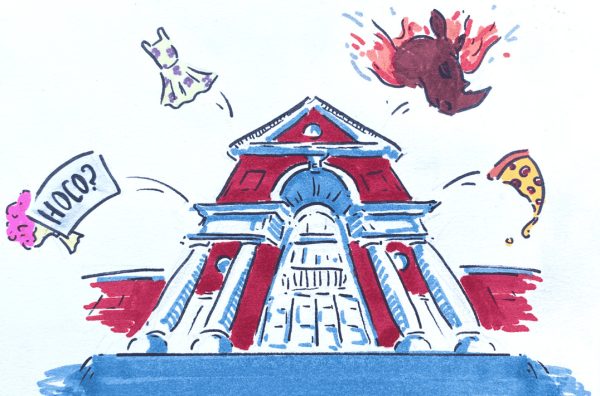The Debate on Seniority
Traditions are not rules. They do not need enforcement. Unlike rules, we can choose whether or not to participate in them. Likewise, a fun signature of student life is vastly different from an obsession with exclusive privileges established through threat and fear. “Walk through the middle doors and you will not graduate” is a tradition, but opting out does not actually get you a mark on your transcript. One tradition, however, has gone too far: seniority.
Last week, I witnessed a group of Seniors heckle and aggressively stop a Prep from taking two chairs from a Senior table. The Prep tables were completely filled, and the Prep and his friends had nowhere to sit. One of the “Senior tables” was empty, but not daring to use the shared space in the Dining Hall because of arbitrary hierarchical rules, they only wanted to take two chairs. The Seniors, two times the size of the Preps, stood up and started yelling at them for taking the “Senior chairs.” The Preps, visibly uncomfortable and scared, did as they were told.
When I was a Prep, I was deeply uncomfortable with how I had to carefully navigate school spaces and “know my place”. The lounges that I envisioned myself chatting and working at when touring the school turned out to be spaces I am “not yet qualified” for; the much closer way to getting sauces for my chicken tenders across the Snack Bar was exclusive to upperclass students; somehow even the one-fourth of space I was allowed at in a shared school facility was often taken by those who have “worked up their ranks” for more access. There are too many stories to list – non-Seniors being yelled at, assaulted, and threatened with notes saying “I know where you live” in their mail boxes. I am still deeply uncomfortable now with the fact that I had to become a Senior to share these thoughts without fear of immense backlash.
The harms of seniority are clear. One’s sense of belonging is directly impacted by their access to space. Sociological research has repeatedly proven relations between access to public spaces and integration into a community, especially for underrepresented and underprivileged students. Historically, the rhetoric we often hear in the school that “they still have access to other spaces” is the same rhetoric used to justify segregation. We know that barring access to spaces is fundamentally wrong and harmful to groups of people – what makes Senior privileges any different? If we take a look back at the countless angry conversations, fishbowls, Record articles written, and proclamations of “Prep grass” or “Prep lounge” from nearly every year, there is no doubt that Senior privileges always upset at least a large portion of students who come into the school aspiring to fully integrate into the community. “I still remember the anxiety I felt walking past Senior Quad,” said Zach Scrima ’22. “Some [Seniors], in fact, were known to ‘bark’… many [lowerclass students] are complacent for fear of ridicule, not out of respect for us Seniors.”
Given the harms, the justifications for seniority are nowhere near sufficient. Age and experience are horrible metrics for determining access and privilege. Traditionally, positions of political and economic authority have all been dominated by white male populations with the most “seniority” in these fields, and minorities are systemically barred from these opportunities because of this faulty metric. In the modern day job market, companies have steered away from promoting and firing based on seniority because it does not meaningfully prove one’s ability or maturity.
Many argue that seniority is associated with respect and responsibility, but association is not entitlement. Forcefully claiming a space and demanding through intimidation and aggression that others must pay respect is counterproductive and frankly embarrassing. Some raise examples, like only being able to drive at sixteen, as a justification for using seniority as a metric for access; however, unlike driving, sitting at the other side of the snack-bar or at Senior lounge does not require any more responsible conduct than what is asked of non-Seniors.
The purpose of listing these parallel examples with more severity is not to argue that Senior privileges are inherently discriminatory (although, after the first Prep, a person of color, put the chairs back, another white Prep was treated with much milder attitudes and allowed to take the chairs, so perhaps exclusivity of privilege inherently favors the majority), but to illustrate why the principles behind these arbitrary rules are flawed. Instances of enforcing seniority appear to be trivial compared to the greater societal implications, but regardless of scale, a wrong is a wrong.
Perhaps deep down we all realize that there is no good justification for seniority, but its reward after three years of deprivation is simply too tempting. The Class of 2021 sat at Senior tables and protested as Preps, but they were furious when a Prep lounge was created when they became Seniors. The Class of 2022, partially as a joke, claimed a Prep grass, but we are mistreating others now. The mindset that “younger students must suffer because I did” is intuitively wrong and oppressive because it perpetuates harm. Even if some of us did not dislike or protest against these privileges before, ware not excused from doing the right thing now. We forget to treat each other with basic human decency and empathy in the cyclical enforcement of seniority.
Access to commodities is not a zero-sum game. Letting a Prep sit at a Senior table simply means sitting at another identical table; sharing Senior grass does not make the space disappear. Enjoying something for four years is objectively better than only enjoying it for one year. It takes a modicum of kindness and empathy to sacrifice the meaningless pride of ruling a hierarchy in exchange for so many students’ sense of security and comfort in our community.
We can preserve traditions without demanding that others must abide by them like rules. Seniority at the school currently demonstrates an obsession with exclusivity and privilege, emblematic of the worst stereotypes of a New England preparatory school. It has to stop.
Community Responses

This graphic shows the results from the survey, sent to students and faculty. 193 people responded.
The following opinions were submitted by students and faculty in response to the survey. Certain respondents chose to remain anonymous.
“Seniority is like a rite of passage. As much as people complain about it, they will be the same ones defending it once it is their privilege. But at the end of the day, that’s all it is. A privilege. A collection of unspoken rules that most of the school doesn’t even know about. So, next time you see someone sitting at the “wrong” table or get up too early at an all-school, instead of berating them, remember that it’s not their fault. They just haven’t been taught. Empathize a little bit. Remember what it was like before you were a Senior.”
–Emiliano Leal ’23
“Seniority in and of itself is a good thing: it’s something everyone can look forward to and eventually enjoy. I do take issue with the enforcement of seniority in certain cases. Seniority is based on respect and, as such, [must be] earned. When Seniors chastise lowerclass students for sitting at a Senior table, Seniors lose respect and thus their seniority. A respectful, polite ask should be all it takes.”
–Cooper Roh ’22
“If we are truly dedicated to equity and inclusion, why would we support systems of exclusion?”
–Mrs. Jane Herold
“There are things at this school that are just traditions. As a Prep, I respected that Seniors had these “rights”, and looked forward to the day where I would be a Senior and I’d be able to do these things. I feel like seniority is a part of the school’s history and we should all learn to respect it.”
–Ore Adedeji ’23
“Seniority gives underclassmen something to work towards. I believe that it is a way for the Senior class to be role models that underclassmen can look up to, but that requires Seniors to be respectful and responsible members of our community. Just because a Prep sits at a Senior table does not mean they have to be chastised for their mistake; we can uphold seniority while still being true to our motto, “Guided by each other, let us seek better paths.””
–Billy Meneses ’22
“Seniority is not about being better than others, or treating people disrespectfully. It is about those who are not Seniors respecting Seniors and the traditions. When we are constantly being berated [for being] poor leaders and not taking our role as leaders of the community seriously, the question must be asked: in what way are we leaders? Because of our age? There are Upper Mids who are older than Seniors, does this mean they too are leaders of our community [in the same way]? No. The reason we are leaders is because the members of the community respect and look up to us. While this may be incentive enough for some, how can it be said we should not have things like Senior tables, Senior quad and Seniors lead, when it is our responsibility to be leaders of the community? If we are expected to act like leaders, treat us with respect and endorse our traditions.”
–Lachlan Penfold ’22
“I like how the tables are separated by grade as it is easier to find your friends this way.”
–Liam Waldron ’25
“It creates an environment that values longevity over merit. With seniority, seniors are not inclined to be the leaders they ought to be.”
–Jill Reichenbach ’24
“When seniority affects the other grades’ way of life negatively, it becomes a problem because it is merely just a custom that should only be done if convenient.”
–Lower Mid
“I think it’s a fun tradition that should be respected to a certain extent. As long as it doesn’t include severe hazing or bullying, I think it’s something to look forward to throughout your time at Hotchkiss.”
–Prep
“Seniors have a responsibility to show the rest of the school what leadership and respect is. They have seen Hotchkiss through good times and bad times but have persevered through it to make it to senior year. They deserve the right to sit at certain tables and enter in through certain doors. It is not as if Senior privileges make our lives significantly harder.”
–Lower Mid
“It breeds a sense of entitlement. Experience should bring responsibility, not entitlement.”
–Faculty Member





